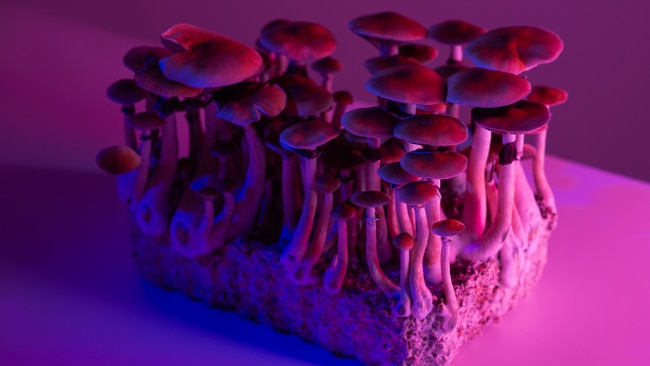Are psychedelics the new frontier of women's health?
Evidence says yes

Mental Health
Don't miss out on the headlines from Mental Health. Followed categories will be added to My News.
If you’ve been prescribed the pill to manage cramps or meds for PMS, you’ll know treatment options for women are frustratingly limited. Now, promising research is indicating brand-new horizons.
Conversations about menstruation vary: lighthearted commiseration with girlfriends? For sure. Accusations of being ‘on your period’ when your partner’s failure to pack school lunch is met with fury? Occasionally. But while mostly treated with levity, these are serious issues.
The Australian Institute of Health and Welfare reports endometriosis affects seven per cent of women aged 25-29 and 11 per cent of women aged 40-44. Postnatal depression impacts 20 per cent of us.
Meanwhile, up to nine per cent of menstruating women struggle with premenstrual dysphoric disorder (PMDD, an extreme version of PMS) and 42 per cent will experience depression during menopause.
Like what you see? Sign up to our bodyandsoul.com.au newsletter for more stories like this.
“Chronic pelvic pain is a debilitating condition,” says Dr Melissa Riddle, a GP at Burraneer Family Practice. “When resistant to treatment, it impacts quality of life and relationships.” Unfortunately, few doctors specialise in the area, and there are even fewer treatments. Recommended courses of action – the contraceptive pill and antidepressants – aren’t appropriate for everyone. Now, a promising breakthrough has come from an unexpected source: psychedelics.
Dr Allison Feduccia is a neuropharmacologist and the co-founder of Psychedelic Support. She’s extensively researched medical applications of psychedelics since 2004, working with organisations like the National Institute of Health and the Multidisciplinary Association for Psychedelic Studies.
According to Dr Feduccia, women are coming forward after microdosing – the practice of consuming very low, sub-hallucinogenic doses of a psychedelic substance, such as lysergic acid diethylamide (LSD) or psilocybin-containing mushrooms – reporting improvements in cramps, PMS and period regularity. This has prompted interest in further research.
So, how do they provide relief? “There’s high interaction between brain chemicals like serotonin and hormones like oestrogen,” explains Dr Feduccia, noting that both impact processes in the body like hunger, sleep and pain sensitivity.
While it’s widely known that serotonin is an important neurotransmitter for gut and mental health, it’s less common knowledge there are also serotonin receptors in the uterus, meaning psychedelic compounds can interact with the area, potentially easing pain and correcting hormonal imbalances. “Think of it as a tuning dial,” she says.

Anthropological evidence currently supports this line of enquiry. Indigenous cultures have used plant-based psychedelics, peyote and ayahuasca, during pregnancy, childbirth and early motherhood for thousands of years, adds Dr Feduccia.
“Women will continue to drink small amounts of ayahuasca during pregnancy or challenging births, and the compounds have also been given to women during and after childbirth to promote lactation.” By acting on the uterus’s serotonin receptors, psychedelics can increase blood flow and alter contractions. They also promote the release of prolactin, which is essential for lactation.
Recent ketamine trials for the treatment of PMDD support the hypothesis. In the trial, ketamine activated oestrogen receptors when administered during the critical premenstrual phase. The result? A decrease in both acute depression and pain.
But there’s one big challenge: a willingness to invest funding in further trials. In 2020, Dr Feduccia was acting as a scientific advisor for two start-ups focused on the application of psychedelics for women’s health. Neither received funding. “I can’t say why, but it’s possible male VCs thought other areas of research were more interesting,” she says wryly.
Further trials are underway for the use of ketamine as a treatment for postpartum depression. The results are promising. “People are analysing breast milk after administration, and finding it passes through the milk after 12 hours.” This is critical information for any treatment of nursing mothers.
Dr Riddle agrees this is far from a niche interest for psychedelic enthusiasts. “It would be wonderful to offer novel treatments once safety and effectiveness is established.”
Originally published as Are psychedelics the new frontier of women's health?


